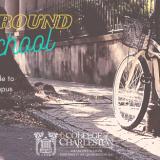Grad Student Alex Jackson (Candidate-M.A. in Communication) is part of an inspiring effort to build ramps across the Lowcountry for people who desperately need them. Read the article from today’s Post and Courier below, and when you’re done register as a volunteer for the Ramp It Up Project:
Ramp It Up wants to build wheelchair ramps in the Tri-County
By Adam Parker
Post and Courier, April 12, 2011 (Page 3B)The physically fit take for granted their ability to climb a set of stairs to their front door or step over an obstacle on the porch. For them, it is natural to negotiate sharp angles and sudden elevations.
But for the those who use a wheelchair, a small step can require a big adjustment. And patience. And strength. And determination. It’s something they must think about, a maneuver to be figured out.
That’s why Alex Jackson, a quadriplegic who has used a wheelchair since he was 9 months old, is pushing hard to get ramps built at more homes and businesses in the Lowcountry. It’s what he calls a “major issue.”
The disabled today rely on much-improved transportation solutions, from electric wheelchairs to vans equipped with joysticks, but all of it is useless if you can’t get from point A to point B, he said.
The people at Human Needs Network and their partner organizations are not sitting idly by. They have decided to tackle the problem of access for the disabled by launching a new volunteer initiative and setting an ambitious goal: “To build every needed wheelchair ramp in the Tri-County by the end of 2011.”
The project is called Ramp It Up, and it launches Saturday at 7:15 a.m. under a tent, on the front lawn of Charleston Southern University with a full breakfast and a brief rally.
In the effort, the faith-based Human Needs Network works with the Disability Resource Center, Operation Home and Trident Area Agency on Aging.
After the Ramp It Up kick-off rally, teams will begin construction (and perhaps a little lawn care) at various homes in the area, using volunteer teams, said Chuck Coward, executive director of Human Needs Network.
This is music to Jackson’s ears.
“A big part of Ramp It Up is letting individuals with disabilities have freedom of mobility,” he said.
Jackson is an intern at the Disability Resource Center and recently completed a two-year term on its board of directors. A graduate student in the College of Charleston’s communication department, Jackson is determined to be as independent as possible.
“I don’t let my disabilities slow me down, I’m involved in so much,” he said.
Jackson was disabled as a toddler returning from a visit to his grandparents in Augusta, Ga., to show off his walking abilities. The car his mother drove was struck head-on when another vehicle crossed into oncoming traffic, he said.
His mother, a pediatrician at the Medical University, was severely injured but recovered. Jackson suffered a debilitating spinal trauma.
“I don’t remember walking,” said Jackson, now 24.
Gwen Gillenwater, executive director of Disability Resource Center, said badly needed access ramps are not easy to build or fund. An adequate ramp costs about $500; a good one costs $1,000, she said.
Building a ramp depends on skilled carpenters and ambitious volunteers who adhere to established codes and structural requirements, she said. “So we’re always looking for collaborations.”
Many disabled people are at risk of falling, becoming trapped or injuring themselves in their own homes, she said.
“The majority of the disabled live in poverty,” which exacerbates the risks, Gillenwater said.
Reach Adam Parker at 937-5902.




